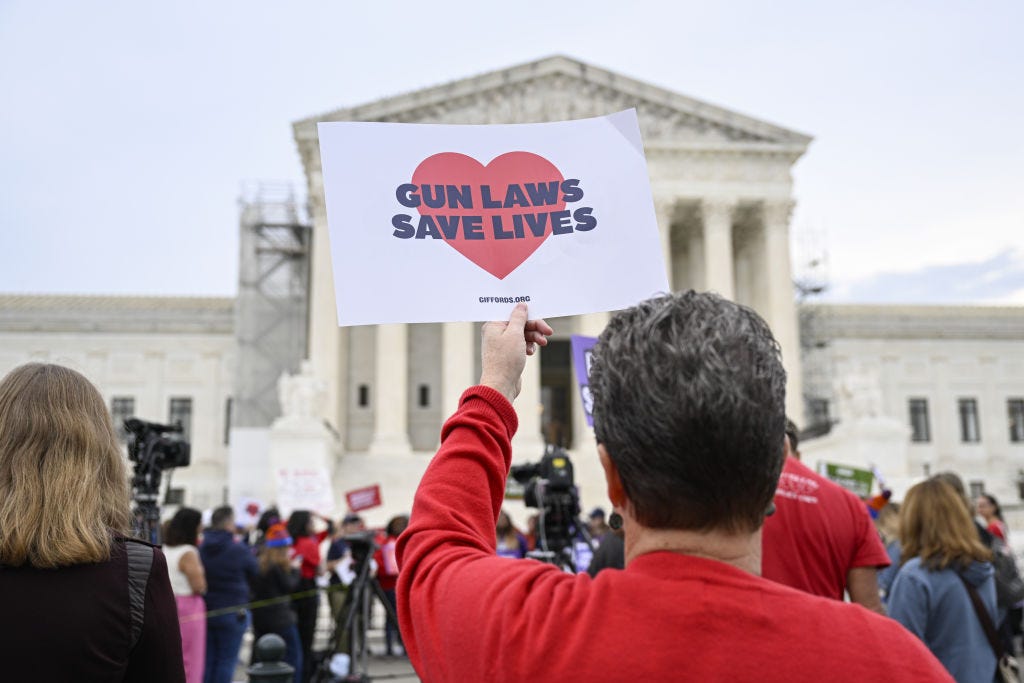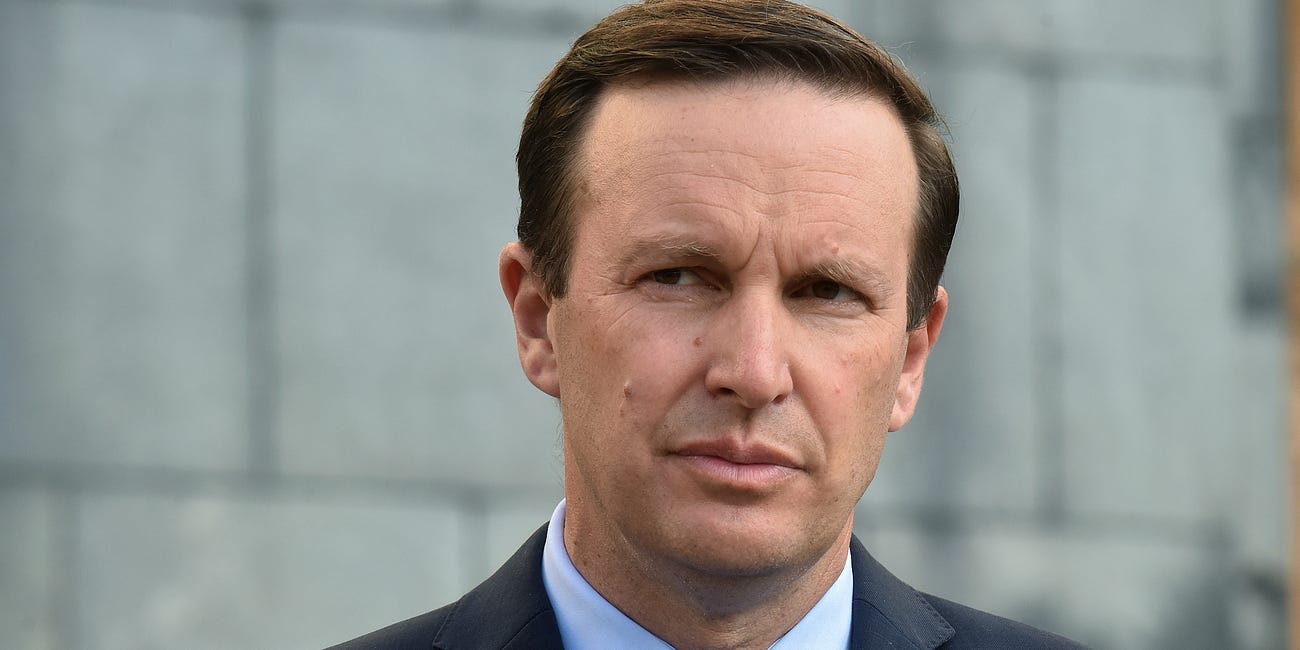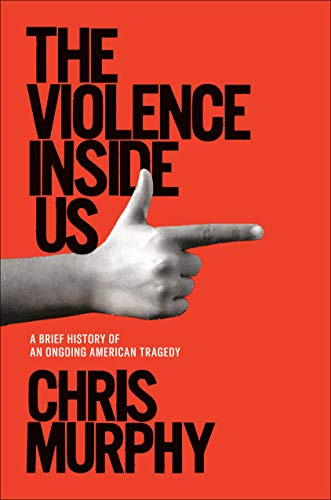FREE FOR ALL: Chris Murphy on America's enduring gun problem
As the surgeon general brings gun safety to the forefront, we look back to what the Connecticut senator told us about the origins of American violence
This week the U.S. surgeon general, Dr. Vivek Murthy, declared gun violence a public health crisis. The United States remains a global outlier in gun violence: the firearm-related death rate in the U.S. is 11.4 times higher than in other high-income countries; more than half of Americans have been involved in a gun-related incident (as a victim, witness, or impacted as a family member); and since 2020 firearm-related injuries have been the leading cause of death for children and teens. Unfortunately, with few positive exceptions, legislators and the courts have been moving in the wrong direction. But for the sake of future generations, says Dr. Murthy, the time for action is now.
Senator Chris Murphy of Connecticut is the rare lawmaker who understands this issue as deeply as the surgeon general does. He has long been a voice for gun control measures, writing a book on gun violence in America, The Violence Inside Us: A Brief History of an Ongoing American Tragedy, and sponsoring the bipartisan Safer Communities Act in 2022, the first major gun safety law in 30 years.
With new attention on the issue in light of Dr. Murthy’s announcement, we encourage you to look back on a wide-ranging conversation we had with Senator Murphy four years ago, right around the time he published his book. We talked about the roots of American gun violence, the necessity for engaging with and dealing with the persistence of racism and inequality in our society, and a host of other pressing issues around the 2020 election. His analysis — and his recommendations — still stand, four years later, underscoring Dr. Murthy’s insistence that the time is right for action.
Each week, we excerpt a piece from our archives for our free subscribers to enjoy. If you appreciate these posts and the labor that goes into them, we’d be honored if you’d join us as a paid subscriber.
A request for those who haven’t yet joined us: The interviews and essays that we share here take research and editing and much more. We work hard, and we are eager to bring on more writers, more voices. But we need your help to keep this going. Join us today as a paid subscriber to support the kind of independent media you want to exist.
You write in the book that humans are the most violent of mammals, and Americans are the most violent of humans among comparable rich countries.
You offer a provocative and, I think, correct assessment of one of the main reasons why: anti-Black racism. Can you explain why that has given America a special propensity toward violence?
I think it's interesting that, as violent as America is around the revolution, we don't start to become a global outlier of violence until the slave population explodes. There's a ton of violence in America in the 1600s and 1700s, but from the data we can glean, it looks like America's homicide rate doesn't start to go into the stratosphere until we have so many enslaved Americans that violence is the defining feature of the American economy.
To me, violence explains a lot about how America has ordered itself from the very beginning. But, for many of our formative years after the Constitution's signing until the eradication of slavery, it took just massive, mind-numbing amounts of violence to keep America's economy running. It stands to reason that we became anesthetized to that violence during that period. I don't think that we've ever got our sense of feeling back.
In that sense, violence was not a bug in the operating system. It was a feature if that was the kind of economy you wanted.
We decided to take a shortcut to economic prominence. We decided to use epidemic levels of violence to enslave an entire race of people to create cheap goods that we could send worldwide. It was a choice we made, but the choice required us to brutally subjugate millions of people in this country. It ended up making violence an acceptable mechanism to maintain economic and social order.
It's no coincidence that, during the 1800s, white-on-white violence was dramatically elevated, especially in the South, because it just became a much more normal course of behavior once you were using it so regularly against slaves.
As more and more Americans are taught a more honest version of American history, it in a way becomes harder for people like you who run for office to tell a true story, and to tell a story that inspires people and lifts people up. I wonder how you think about this twin obligation — to tell a true and dark and blood-at-the-root story of America, and yet not be a Debbie Downer whom no one wants to vote for.
This reckoning we're having with our past is necessary, but it also comes with real consequences for one of the few threads of fabric that unites the country. As we all retreat to our corners, as we all get our information from different sources with different spins, our founding ideals and founding mythology are among the few things that we have left in common. Now, we're not even sure what that mythology is.
Here's how I think about it. Notwithstanding the fact that there was an enormous amount of violence necessary to stand up the American economy in the late 1700s, and notwithstanding the fact that most of our founding fathers were part of that slave economy, their ideas were nonetheless revolutionary. The developing idea of America, as we brought in people from all sorts of different places in the world, is no less revolutionary.
I think we can acknowledge the unconscionable flaws at America's founding while still recognizing that these two ideas — a government based upon the self-determination of a people, and a multicultural society in which everybody gets to be an American but also retain part of their heritage — those are off-the-wall ideas. We should accept that we are always in the process of getting better and getting closer to actually realizing them.
In the book, you link the special propensity for violence in America to our heterogeneity and how it intersects with in-built human tribalism. As America becomes a majority-minority country in the ensuing decades, if we don't do some of the big course-changing things that you advocate for in the book, would you expect us to become more rather than less violent?
The data show that violence tends to increase when you have large numbers of new entrants to America competing for scarce economic space. That makes sense, given that overall violence does tend to track poverty. As this one man told me on the streets of Baltimore, "Hunger, it hardens your heart."
To the extent that white Americans are still the dominant power class in this country, as there become more non-whites and more threats to the white hierarchy, it stands to reason that there will likely be more chances for violent outbreaks. That means it's incumbent upon us to reduce the number of firearms and reduce the chances of police brutality so that there are fewer mechanisms by which to allow in-groups to perpetuate violence against out-groups.
It also means that we’ve got to be serious about creating less economic scarcity. If our history tells us that economic scarcity can lead to violence, then let's create a system in which more people can access economic success.
The writer Valarie Kaur has this question that I love and feel so appropriate in this time of darkness that we're all experiencing. She asks, "What if this darkness is not the darkness of the tomb, but the darkness of the womb?" How do you think about whether this is a moment of American death, of that kind of democratic expiration you're talking about, or whether this feels like some kind of very awkward rebirth?
I don't know that it's either. I think there's a chance that there is an American reconstruction that happens on the back end of this, but I also think it's possible this was an anomalous leader, and we get back to the old trajectory that we were on, which is, for many of us, not satisfactory.
Steven Pinker's book “The Better Angels of Our Nature” is the most optimistic piece of history that I've ever read in my life. The basic supposition is that over the long course of human history, humans are finding ways to get along, ways to live longer, ways to spread prosperity, ways to figure out means to address grievances other than violence.
Over the long term, we find ways as human beings to make things better. There are lots of peaks and valleys along the way, and there are lots of people who lead really shitty lives even amidst a trendline that looks better for humanity. I don't know what's in store for America in the next one hundred years. I'm going to work like hell while I'm on the earth to try to make sure that this democracy survives and improves its foundation.
Chris Murphy is a Democratic senator from Connecticut. He is the author of the new book “The Violence Inside Us: A Brief History of an Ongoing American Tragedy.”
Your support makes The Ink possible. We’d be honored if you’d become a paid subscriber. When you do, you’ll get access each week to our regular posts and our interviews with the most thoughtful people out there — and you’ll be able to join the conversation in our comments section.







I'm glad you re-posted this interview as it's a very important conversation. Unfortunately, one variable in this conversation is always overlooked. Most violence is committed by men. Why is this? What is it about too many men that they believe they are allowed to use violence to force others to do what they want? This is also a universal fact around the world, but the difference is that men in the US have easy access to guns.
Chris Murphy here provides some hope regarding some of those who chose to enter the political arena. It's heartening to see a cogent, substantive treatment of one of the fundamental contentious issues that has so divided this society.
And since the "like" comment icon doesn't seem functional (at least in my browser), I would like to thank Patricia Jaeger for her question (really, almost as much a tautology): most violence is committed by men - for the same reason - likely a species characteristic.
It is just what we seem to be. What men, in particular, seem to be.
Which doesn't let us off the hook; our responsibilty is to recognize this honestly, and attempt as best we can to negotiate with this behavioral tendency within us. (But yikes! What are the prospects for this? Steven Pinker aside, do we really do with this anything? A reading of hIstory would seem to offer different interpretations. )